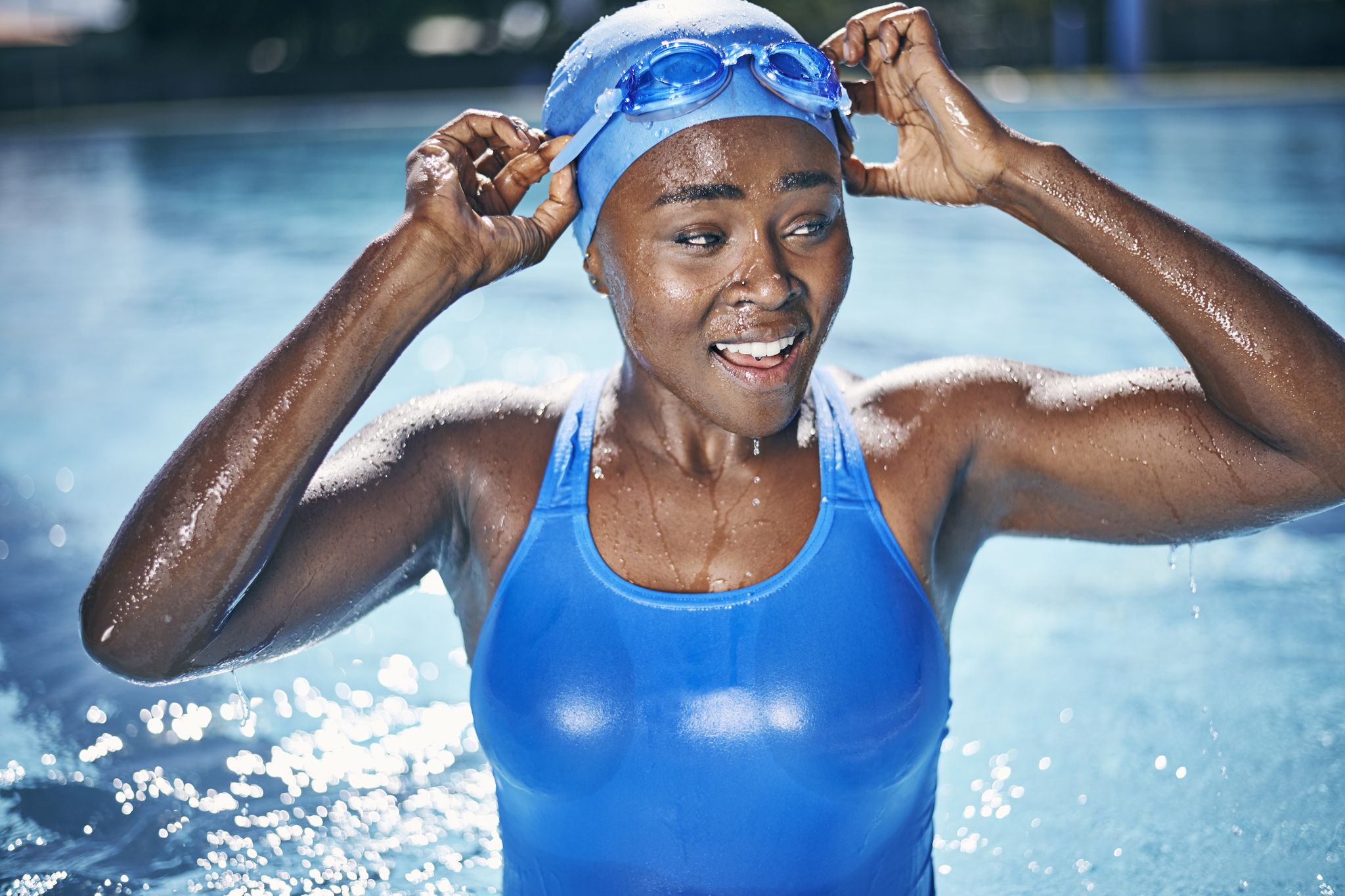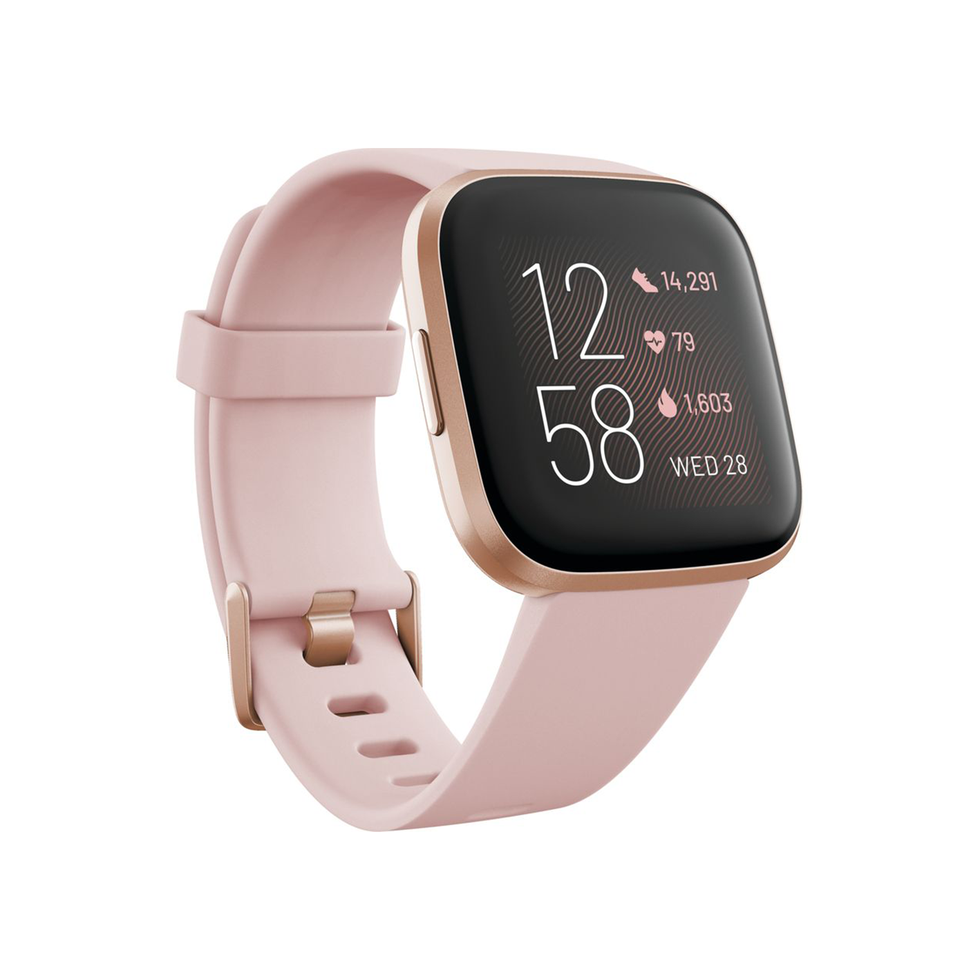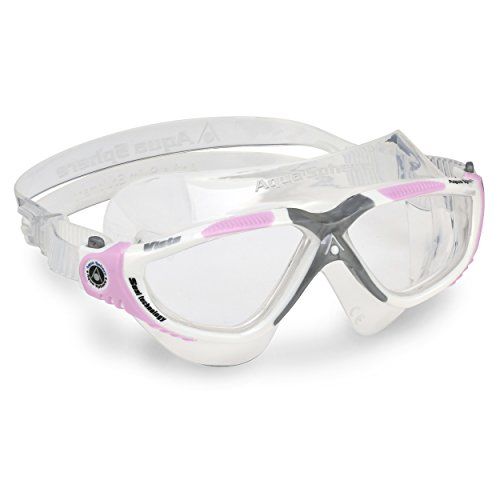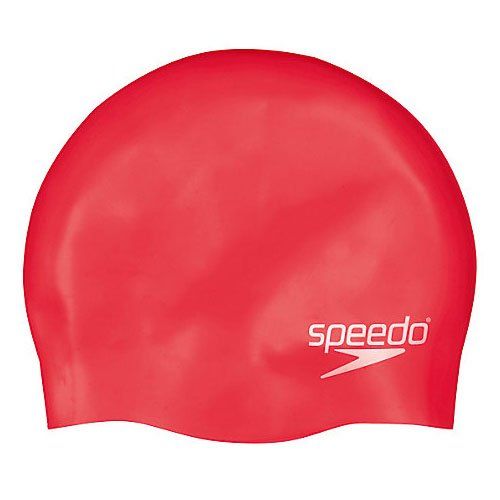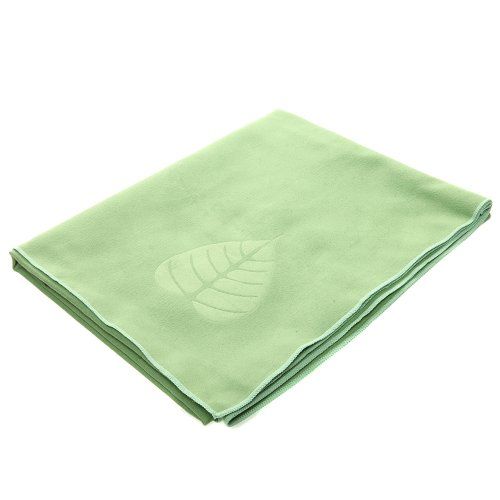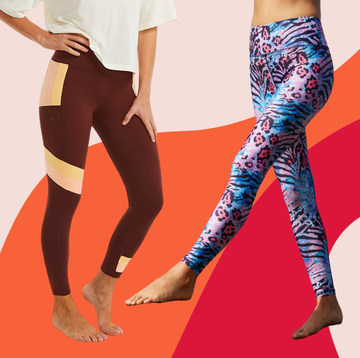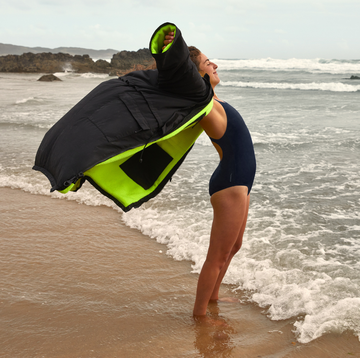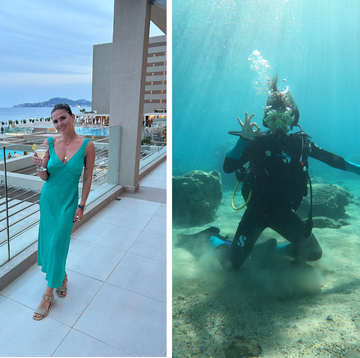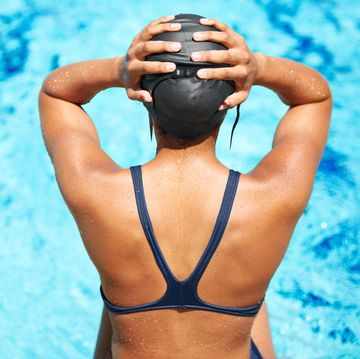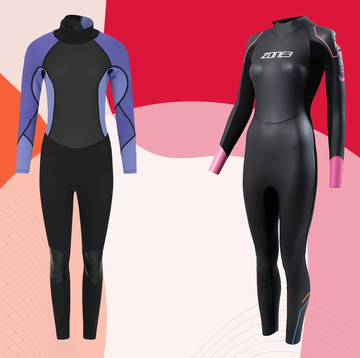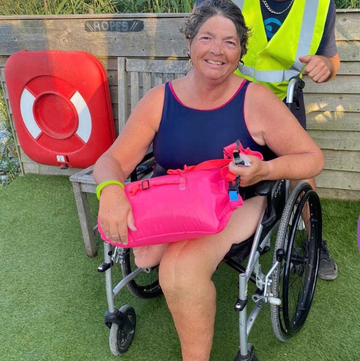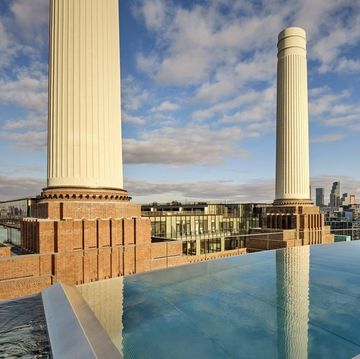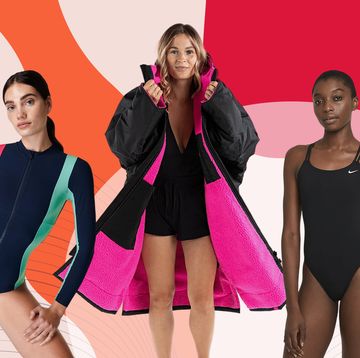Swimming is one of the best workouts to dive into (pun intended) if you want to kick up both your cardio and strength training.
Thanks to the built-in resistance you get from H2O, your muscles have to fight to keep moving, whether you’re freestyle swimming or straight up walking through the water.
'I think the main benefit of swimming is that you get a total-body workout,' says Julia Russell, NASM-certified personal trainer, swim instructor and former Olympic swimmer. 'And you can tailor your workout to your endurance or strength goals.'
Plus, swimming really makes a splash when it comes to revving your heart rate: You use every major muscle groups in each stroke you take, from your arms to your core to your legs—all without extreme impact on the joints.
'People who suffer from injuries or have conditions like arthritis or multiple sclerosis will benefit from this form of exercise,' because of that no-impact factor, says Russell.
While swimming may seem an odd choice as the days draw in and frosty winds bellow, making the most of the pool can be a great decision if you're trying to improve your cardio fitness generally.
The suspension of your body makes swimming a low impact exercise and means you can get all the benefits of a cardio workout without inflicting stress or too much impact on your joints.
Cross-training in this way can help make fitness gains, prevent injury, stave off burnout and also helping with mental gains. Er, love it!
So, dig out your cozzie, snap on your best swimming cap and dive in! It'll probably be calmer in the pool than the gym floor come January, anyways...
How to get started with swim workouts
If you’re fresh to the swim scene, start with core stability to practice for your pool performance, says Cameron Martinez, personal trainer and swim instructor.
You need a strong core to hold your body up in the water and maintain that straight line from shoulders to ankles. If your core is weak, your hips will like droop, making it hard to stay afloat.
To build up strength, aim to hold forearm and side planks, as well as hollow holds, for 30 to 60 seconds. Squats and deadlifts will also help you to build the strength you need in your legs to kick through each stroke, he adds.
When you feel like you've adequately strengthened your core, take it to the pool and swim for as long as you can, and rest for as long as you need, says Russell. It’s all about taking it at your own pace. As soon as you can swim for 20 minutes without stopping, you’re ready for a full-on workout.
'You didn’t learn to ride a bicycle overnight, but once you learned you never lost the skill—swimming is the same way,' says Russell. 'Set goals for yourself and surround yourself with people or an instructor who will keep you accountable.'
A common mistake people make as soon as they hit the water: breaking form. 'If the middle of the body (or the core) sags or the feet start to ride low, you’re going to increase resistance or drag, which will slow you down and waste energy,' says Russell. 'You want to be as straight and streamlined in the water as possible.'
Proper breathing technique also makes big waves in how well you swim. Russell suggests practicing breathing by holding onto a kickboard and doing flutter kicks with the feet. As you move the legs, turn your head to the side to inhale through your nose, then exhale with your face in the water.
Don’t forget to alternate which side you turn your head to breathe, so you avoid any imbalances in the body, says Martinez.
Finally, note that you should rotate your entire body with each stroke. “A lot of people think you need to stay flat on your stomach, but you should be rotating as you move,” Martinez says.
'The entire body—shoulders and hips—should be connected and roll to the side as one arm extends, and then roll to the other. Meanwhile, the head stays put and you look toward the bottom of the pool.'
When you’re ready to make a full stroke, jump into these 16 workouts designed by three swim pros. Each one offers a different plan to please every fitness level (beginner, intermediate, and advanced) and any exercise goal (from strength-building to endurance-enhancement).
Pick what fits your needs, then dive on into the fun routine that gets you fit. (Not ready to actually swim yet? Don’t worry, workouts 14–16 below are more aqua aerobics-inspired so you can still get your sweat on in the water.)
Swim workouts for every level
Keep in mind that most pools span 25 metres in length. One full lap (down and back) typically equals 50 metres. Remember your strong stroke form and efficient breathing as you go!
1. THE GET-USED-TO-THE-WATER WORKOUT
Martinez created this workout to help anyone who's easing in to swimming. You won’t spend big chunks of time on your stroke, but rather get used to what it feels like to push through approachable distances. Let this help you get comfortable moving in H2O, before you turn it up a notch.
- 8 x 25 metres flutter kick with board with 15 seconds rest
- 4 x 50 metres alternate laps of freestyle (odds) and backstroke (evens) with 20 seconds rest
- 8 x 25 metres alternate sprint kicks (odds) and easy kicks (evens) with 10 seconds rest in between laps
- 60 seconds rest
- 8 x 25 metres freestyle with 15 seconds rest in between laps
- 4 x 50 metres freestyle with 20 seconds rest in between laps
- 8 x 25 metres alternating sprint freestyle (odds) and easy backstroke (evens) with 10 seconds rest in between laps
2. BEGINNER 30-MINUTE DISTANCE WORKOUT
If you’re not used to swimming long distances, but you feel strong in the water, this workout is for you. Martinez offers easy freestyle and kicking intervals to help you increase your distance.
- 4 x 25 metres freestyle with 15 seconds rest in between laps
- 8 x 50 metres fast kick with 20 seconds rest in between laps
- 4 x 25 metres freestyle with 15 seconds rest in between laps
- 1 min rest
- 4 x 25 metres freestyle with 15 seconds rest in between laps
- 6 x 100 metres alternating easy freestyle (odds) and hard freestyle (evens) with 30 seconds rest
- 4 x 25 metres freestyle with 15 seconds rest
3. BEGINNER’S GUIDE TO SWIM HIIT
This high-intensity interval workout from Russell will get your heart rate up and build muscle.
'It’s perfect for a beginner because it combines both swimming and weights, giving the beginner swimmer a total-body workout, while focusing on only the freestyle stroke,' Russell says.
Take rest as you need it but keep pushing when you can. You will need a kickboard, pull buoy—or a figure 8-shaped foam tool that you put between your legs to work your arms more—and aqua weights for this workout. If you don’t have ‘em, skip ‘em.
Warm up with easy freestyle swimming for two to five minutes. (Optional: Use a kickboard every other lap.)
- 25 metres freestyle at medium pace
- 40 second rest
- 2 x 25 metres freestyle at hard pace with 30 second rest in between laps
- 2 x 25 metres kicking with board at hard pace with 35 second rest in between laps
- 25 metres freestyle easy with pull buoy
- 30 second rest
- 2 x 25 metres freestyle hard with pull buoy with 40 second rest in between laps
- 25 metres freestyle easy
- 30 second rest
- 2 x 25 metres freestyle hard with 45 second rest in between laps
- 25 metres freestyle medium
- 40 second rest
- 2 x 25 metres freestyle hard with 30 second rest in between laps
- 25 metres freestyle easy
- 50 metres walking lunges in pool, with weights starting at your side and lifting up to shoulder height for a forward raise at the top of each lunge (begin with foam weights, then move up in one pound increments as you get stronger)
- 30 second rest
- 40 seconds high knees in place
- 50 metres walk backward and use aqua weights for shoulder press (straight overhead, palms face each other)
- 30 second rest
- 40 seconds squat with biceps curl
- 30 second rest
- 40 seconds squat with tricep extension
- 30 second rest
- 40 second squat with rows
- 30 second rest
- 40 seconds high knees in place
- 60 second rest
- Repeat from the lunges for 2-3 rounds.
4. INTERMEDIATE SPRINT WORKOUT FOR LONGER DISTANCES
Focus on pushing your pace through longer builds and fast sprints, and using the rest periods to your advantage.
- 6 x 50 metres flutter kick on board with 20 seconds rest in between laps
- 3 x 100 metres alternating freestyle (odds) and backstroke (evens) with 30 seconds rest in between laps
- 6 x 50 metres alternating sprint kick (odds) and easy kick (odds) with 15 seconds rest in between laps
- 1 min rest
- 6 x 50 metres freestyle with 20 seconds rest in between laps
- 3 x 100 metres freestyle with 30 seconds rest in between laps
- 6 x 50 metres alternating sprint freestyle (odds) and easy backstroke (evens) with 15 seconds rest in between laps
5. LEVEL 2 ONE-HOUR ENDURANCE SWIM WORKOUT
This intermediate routine from Martinez allows you to get better at swimming longer and farther. Focus on building your speed as you go (noted by "build" below).
Warm up with 200 metres freestyle, 150 metres pull with a pull buoy, then 100 metres kick with board.
- 2 x 500 metres freestyle (broken up per below) with 30 seconds rest
- 25 metres easy; 25 metres build
- 50 metres easy; 50 metres build
- 75 metres easy; 75 metres build
- 100 metres easy; 100 metres build
- 1 min rest
- 2 x 200 metres kicking with board (broken up per below) with 30 seconds rest
- 25 metres easy; 25 metres fast
- 50 metres easy; 50 metres fast
- 25 metres easy; 25 metres fast
Cool down with 200 metres easy freestyle.
6. INTERMEDIATE-LEVEL CARDIO PLAN
'This workout is perfect for the intermediate swimmer, as she will work close to maximum effort at a hard pace for short bursts of time,' says Russell, who designed the workout.
'This will increase your heart rate with intense effort intervals.' You’ll need a kickboard, a pull buoy, and aqua weights for this level-two session.
Warm up with 2 minutes easy freestyle, then 4 x 25 metres alternating easy swim and sprint swim.
- 150 metres freestyle at medium pace
- 45 seconds rest
- 4 x 25 metres freestyle at hard pace with 25 seconds rest in between laps
- 100 metres alternate freestyle and backstroke at medium pace
- 45 seconds rest
- 4 x 25 metres kicking hard with 30 seconds rest in between laps
- 100 metres freestyle easy with pull buoy
- 45 seconds rest
- 4 x 25 metres freestyle hard with pull buoy with 35 seconds rest in between laps
- 100 metres alternate freestyle and breaststroke easy
- 45 seconds rest
- 2 x 25 metres freestyle hard with 40 seconds rest in between laps
- 2 x 25 metres breaststroke hard with 50 seconds rest in between laps
- 100 metres any stroke easy
- 1 min rest
- 75 metres walking lunges in pool, with weights starting at your side and lifting up to shoulder height for a forward raise and lateral raise (alternating) at the top of each lunge
- 30 seconds rest
- 40 seconds high knees in place
- 30 seconds rest
- 75 metres walk backward and use aqua weights for shoulder press (straight overhead, palms face each other)
- 45 seconds squat with biceps curl
- 30 second rest
- 45 seconds squat with tricep extension
- 30 second rest
- 45 second squat with rows
- 30 second rest
- 40 seconds high knees in place
- 60 second rest
- Repeat from the lunges for 3 rounds
7. THE ADVANCED EFFICIENCY WORKOUT
The goal of counting your strokes in this workout: to take fewer and fewer to get across the pool.
Focus on making each arm circle as efficient as possible by picturing yourself placing your hand in your pocket under water and then letting your fingertips drag along the surface (elbow high) as you bring the arm forward. Make sure your hands don’t go extra-wide, which can strain the shoulder, says Martinez.
Warm up with 300 metres freestyle swim, 200 metres pull with buoy, 100 metres kick with board.
- 4 x 50 metre freestyle with 10 seconds rest in between laps
- 4 x 100 metres counting your strokes per length with 20 seconds rest in between laps (aim to take one fewer stroke each round)
- 4 x 50 metres kick with board with 15 seconds rest in between laps
- 8 x 50 metres alternating sprint freestyle (odds) and sprint stroke count (evens) with 10 seconds rest in between laps
Cool down with 200 metres freestyle easy.
8. ADVANCED-LEVEL 60-MINUTE ENDURANCE WORKOUT
Another from Martinez, this distance-focused workout adds breaststroke to the swim mix (along with freestyle). It should take about an hour.
Warm up with 300 metres freestyle swim, 200 metres pull with buoy, and 100 metres kick with board.
- 3 x 300 metres freestyle (broken up per below) with 40 seconds rest in between laps
- 25 metres easy; 25 metres fast
- 50 metres easy; 50 metres fast
- 75 metres easy; 75 metres fast
- 2 x 200 metres breaststroke (broken up per below) with 30 seconds rest in between laps
- 25 metres easy; 25 metres fast
- 50 metres easy; 50 metres fast
- 25 metres easy; 25 metres fast
- 1 x 100 metres first half fast freestyle; second half fast breaststroke with 20 seconds rest after
- 2 x 200 metres breaststroke (broken up per below) with 30 seconds rest in between laps
- 25 metres easy; 25 metres fast
- 50 metres easy; 50 metres fast
- 25 metres easy; 25 metres fast
- 3 x 300 metres freestyle (broken up per below) with 40 seconds rest in between laps
- 25 metres easy; 25 metres fast
- 50 metres easy; 50 metres fast
- 75 metres easy; 75 metres fast
Cool down with 200 metres easy swimming.
9. ADVANCED HIIT WORKOUT
If you’re familiar with and confident doing all four swim strokes (freestyle, backstroke, breaststroke, and butterfly), this workout is for you.
You’ll give all-out efforts and recover between laps. Russell says you’ll use all muscle groups in this workout, so prepare for a full-body burn. Grab a kickboard, a pull buoy, and aqua weights for this one.
Warm up with 2 minutes easy freestyle, then 4 x 25 metres alternating easy swim and sprint swim.
- 200 metres freestyle at medium pace
- 40 seconds rest
- 6 x 25 metres freestyle at hard pace with 25 seconds rest in between laps
- 150 metres alternate freestyle and backstroke at a medium pace
- 40 seconds rest
- 4 x 25 metres kicking hard with 30 seconds rest in between laps
- 200 metres freestyle medium with pull buoy
- 40 seconds rest
- 4 x 25 metres freestyle hard with pull buoy with 30 seconds rest in between laps
- 150 metres alternate freestyle and breaststroke medium
- 40 seconds rest
- 2 x 25 metres butterfly hard with 50 seconds rest in between laps
- 2 x 25 metres backstroke hard with 40 seconds rest in between laps
- 2 x 25 metres breaststroke hard with 45 seconds rest in between laps
- 100 metres alternate breaststroke and backstroke easy
- 1 min rest
- 100 metres walking lunges in pool, with weights starting at your side and lifting up to shoulder height for a forward raise and lateral raise (alternating) at the top of each lunge (begin with foam weights, and move up in one pound increments as you get stronger)
- 20 seconds rest
- 60 seconds high knees in place
- 20 seconds rest
- 100 metres walk backward and use aqua weights for shoulder press (straight overhead, palms face each other)
- 60 seconds squat with biceps curl
- 20 second rest
- 60 seconds squat with tricep extension
- 20 second rest
- 60 second squat with rows
- 20 second rest
- 60 seconds high knees in place
- 60 second rest
- Repeat from the lunges for 3–4 rounds.
10. THE BUILD-ENDURANCE PLAN FOR EXPERIENCED SWIMMERS
For this workout, you’ll focus on low-intensity steady state training (or LISS). That means you’ll swim a longer distance while working at about 60 percent to 70 percent of your max heart rate (HRM), says Russell. (You may want to try using a waterproof fitness tracker to keep tabs on this.)
- 4 x 100 metres freestyle (65 percent HRM) with 30 seconds rest in between laps
- 3 x 75 metres freestyle (70 percent HRM) with 30 seconds rest in between laps
- 3 x 100 metres freestyle (65 percent HRM) with 30 seconds rest in between laps
- 3 x 75 metres freestyle (70 percent HRM) with 30 seconds rest in between laps
- 2 x 100 metres freestyle (65 percent HRM) with 30 seconds rest in between laps
11. THE SPRINTS TO BUILD MUSCLE WORKOUT
Find your speed in the water with this workout made for intermediate and advanced swimmers, designed by Martinez. You’ll want a buoy and a kickboard for the warm up and a few of the sprints.
Warm up with 4 x 100 metres freestyle swim, 4 x 50 metres pull with buoy, 8 x 25 metres kick with board.
- 10 x 50 metres alternating flutter kick with board (odds) and breaststroke kick with board (evens) with 20 seconds rest in between laps
- 1 min rest
- 2 x 25 metres fast freestyle with 5 seconds rest
- 2 x 50 metres fast freestyle with 10 seconds rest
- 2 x 25 metres fast freestyle with 5 seconds rest
- Repeat 3 times
Cool down with 200 metres freestyle easy.
12. REACHING YOUR ALL-OUT EFFORT WORKOUT
You get lots of rest time in this workout, so that means your fast sprints should be really fast. You want to reach for that 10 out of 10 effort. 'You get what you put in to this one,' says Martinez, who came up with the plan. It should take you about 45 minutes to complete.
Warm up with 4 x 100 metres freestyle swim, 4 x 50 metres pull with buoy, and 8 x 25 metres kick with board.
- 10 x 25 metres fast freestyle (taking 0–1 breaths) with 25 seconds rest in between laps
- 8 x 25 metres easy backstroke with 20 seconds rest in between laps
- 8 x 25 metres fast freestyle (taking 0–1 breaths) with 20 seconds rest in between laps
- 6 x 25 metres easy backstroke with 20 seconds rest
- 6 x 25 metres fast freestyle (taking 0–1 breaths) with 15 seconds rest in between laps
- 4 x 25 metres easy backstroke with 20 seconds rest
- 4 x 25 metres fast freestyle (taking 0–1 breaths) with 10 seconds rest in between laps
- 2 x 25 metres easy backstroke with 20 seconds rest in between laps
- 2 x 25 metres fast freestyle (taking 0–1 breaths) with 5 seconds rest in between laps
Cool down with 200 metres freestyle easy.
13. THE BREATHING WORKOUT FOR ANY LEVEL
Beyond strength and cardio gains, swimming can also help with breath control and lung capacity, says Russell.
'When you first learn how to swim, or when you are in the beginner phase, swimming can feel exhausting due to the fatigue that comes from oxygen deprivation,' she says. By doing breathing-focused workouts, you can help improve your breathing endurance.
For starters, try to swim 25 metres freestyle at a comfortable pace, without taking a breath. 'Only go as far as you are able and then stop,' Russel suggests. 'Make a mental note of how far you got. As you repeat the 25 metres, try to make it further.' The goal is to increase the number of rounds you do every few days, working your way up to 15 and making sure you take 30 to 60 seconds of rest between rounds.
For another way to improve your breathing, try the workout below.
Set 1: 12 x 75 metres freestyle with 30 seconds rest (broken up per the below)
- First 25 metres: breathe every 7 strokes
- Second 25 metres: breathe every 5 strokes
- Third 25 metres: breathe every 3 strokes
Set 2: 10 x 100 metres freestyle with 30 seconds rest (broken up per the below
- Rep 1–3: breathe every 7 strokes
- Rep 4–7: breathe every 5 strokes
- Rep 8–10: breathe every 3 strokes
Set 3: 10 x 50 metres freestyle with 30 seconds rest (broken up per the below)
- First 25 metres: breathe every 9 strokes
- Second 25 metres: breathe every 3 strokes
Conclude with 8 x 25 metres freestyle with no breathers with 45 seconds rest
14. BEGINNER-LEVEL AEROBIC WORKOUT
Designed by YMCA’s senior manager of aquatics, Lindsay Mondick, this water workout involves aerobic moves like walking and high knees. You don’t have to be the best swimmer to do this routine—you just have to be willing to work hard and get comfortable moving in H2O.
Warm up with 5 minutes easy walking.
- 2 minutes fast walking
- 2 minutes slow walking
- 2 minutes high knees
- Repeat 5 times
Cool down with 5 minutes easy walking.
15. YOUR SHALLOW-END WORKOUT FOR CARDIO AND STRENGTH
Take your typical cardio workout to the water with this sequence from Mondick, designed for intermediate fitness levels.
You’ll incorporate moves like cross-country skiing (opposite arms and legs swing back and forth, with your legs straight, like you're shuffling your skis) and jumping jacks, which involve the same movement patterns as you’d do on land—the water just adds some resistance, while eliminating the impact.
You’ll also incorporate strength moves. When you do, be sure to make the mind-body connection and actively engage the muscle you’re working.
Warm up with 5 minutes easy walking and progressing to a light jog.
- 3 minutes cross-country skiing
- 3 minutes jumping jacks
- 1 minute easy walking
- 3 minutes elbow flexion and extension (palms face up to perform bicep curl to shoulders, then actively press against water to flex elbow, working triceps)
- 3 minutes cross-country skiing without touching the bottom
- 3 minutes jumping jacks without touching the bottom
- 1 minute easy walking
- 3 minutes shoulder abduction and adduction (lower down so shoulders are in water; with palms facing each other and arms at shoulder height, pull your arms wide (working the back) and then press them back together (targeting the chest).
Cool down with 5 minutes easy walking.
16. THE SHALLOW TABATA WORKOUT
If you want to stick to the waist-deep water, but still turn your heart rate on high, this interval workout is for you.
Created by Mondick, you’ll move through exercises like jacks, squat jumps, strength moves, and kicks—all of which become low-impact when you’re in the water. You want to push your limits during the 20-second intense intervals, then use the 10 seconds of rest to catch your breath before you get right back to it.
Warm up with 5 minutes jogging, cross-country skiing, or jumping jacks.
Tabata 1:
- 20 seconds squat jumps (aim to pull your knees to the surface)
- 10 seconds rest
- Repeat 8 times
Tabata 2:
- 20 seconds elbow flexion and extension (a.k.a. bicep curls)
- 10 seconds rest
- Repeat 8 times
Tabata 3:
- 20 seconds cross-country skiing without touching the ground
- 10 seconds rest
- Repeat 8 times
Tabata 4:
- 20 seconds straight leg kicks to the front, arms reaching to opposite toes
- 10 seconds rest
- Repeat 8 times
Tabata 5:
- 20 seconds shoulder abduction and adduction (aka standing chest and reverse flies)
- 10 seconds rest
- Repeat 8 times
Cool dow with 5 minutes walking or jogging.
Like this article? SIGN UP TO OUR NEWSLETTER to receive your weekly dose of features.
